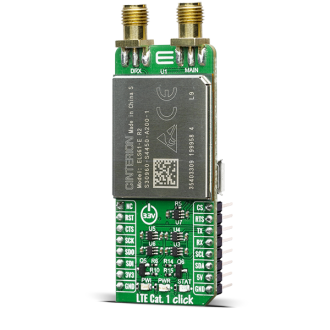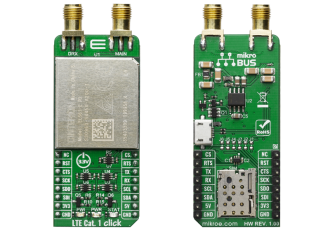
We strongly encourage users to use Package manager for sharing their code on Libstock website, because it boosts your efficiency and leaves the end user with no room for error. [more info]

Rating:
Author: MIKROE
Last Updated: 2019-12-20
Package Version: 1.0.0.0
mikroSDK Library: 1.0.0.0
Category: GSM/LTE
Downloaded: 4660 times
Not followed.
License: MIT license
LTE Cat.1-EU click is a Click board based on Thales Cinterion ELS61 wireless module that delivers highly efficient Cat 1 LTE connectivity for M2M IoT solutions offering seamless fall back to 2G and 3G networks.
Do you want to subscribe in order to receive notifications regarding "LTE Cat.1-EU click" changes.
Do you want to unsubscribe in order to stop receiving notifications regarding "LTE Cat.1-EU click" changes.
Do you want to report abuse regarding "LTE Cat.1-EU click".


Library Description
The library covers all the necessary functions to control LTE Cat. 1 click board. Library carries generic command parser adopted for AT command based modules.
Key functions:
void ltecat1_cmd_single ( uint8_t *p_cmd ) - Sends provided command to the module function.uint16_t ltecat1_set_handler( uint8_t *p_cmd, uint32_t timeout, ltecat1_handler_t p_handler ) - Handler assignation to the provied command function.void ltecat1_module_power ( uint8_t power_state ) - Enables or disables module power function.Examples description
The application is composed of three sections :
void application_task ( )
{
char rsp_com[ 50 ] = {0};
// GSM
// CORE STATE MACHINE
ltecat1_process( );
if (0 != call_flag)
{
ltecat1_cmd_single( <ECAT1_ATH[ 0 ] );
Delay_ms( 3000 );
call_flag = 0;
}
}
void ltecat1_default_handler( uint8_t *rsp, uint8_t *ev_args ) - Default handler.Other mikroE Libraries used in the example:
Additional notes and informations
Depending on the development board you are using, you may need USB UART click, USB UART 2 click or RS232 click to connect to your PC, for development systems with no UART to USB interface available on the board. The terminal available in all MikroElektronika compilers, or any other terminal application of your choice, can be used to read the message.